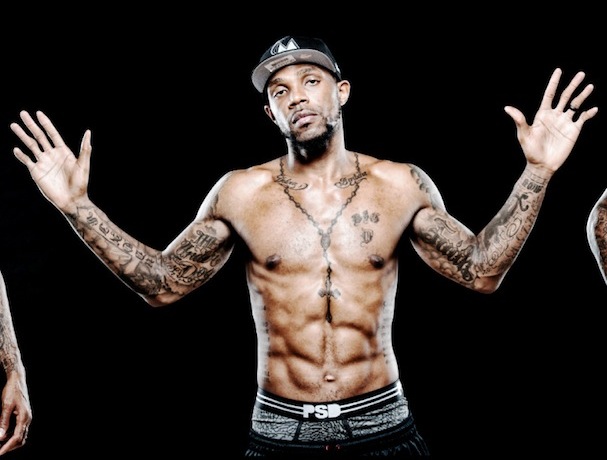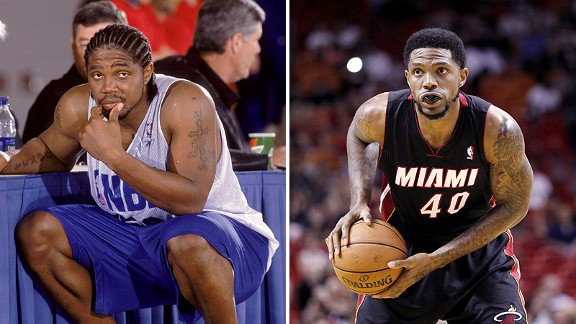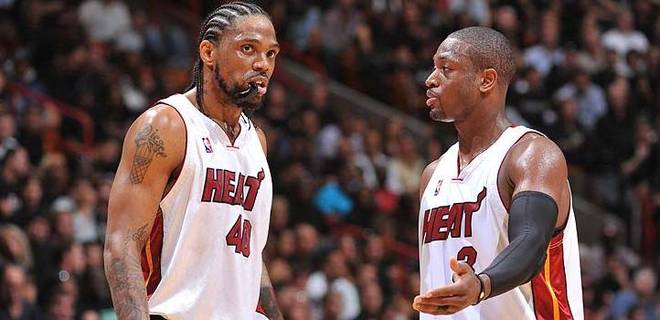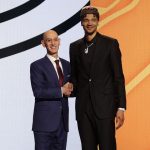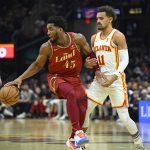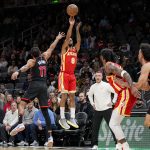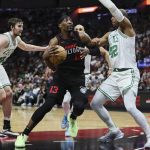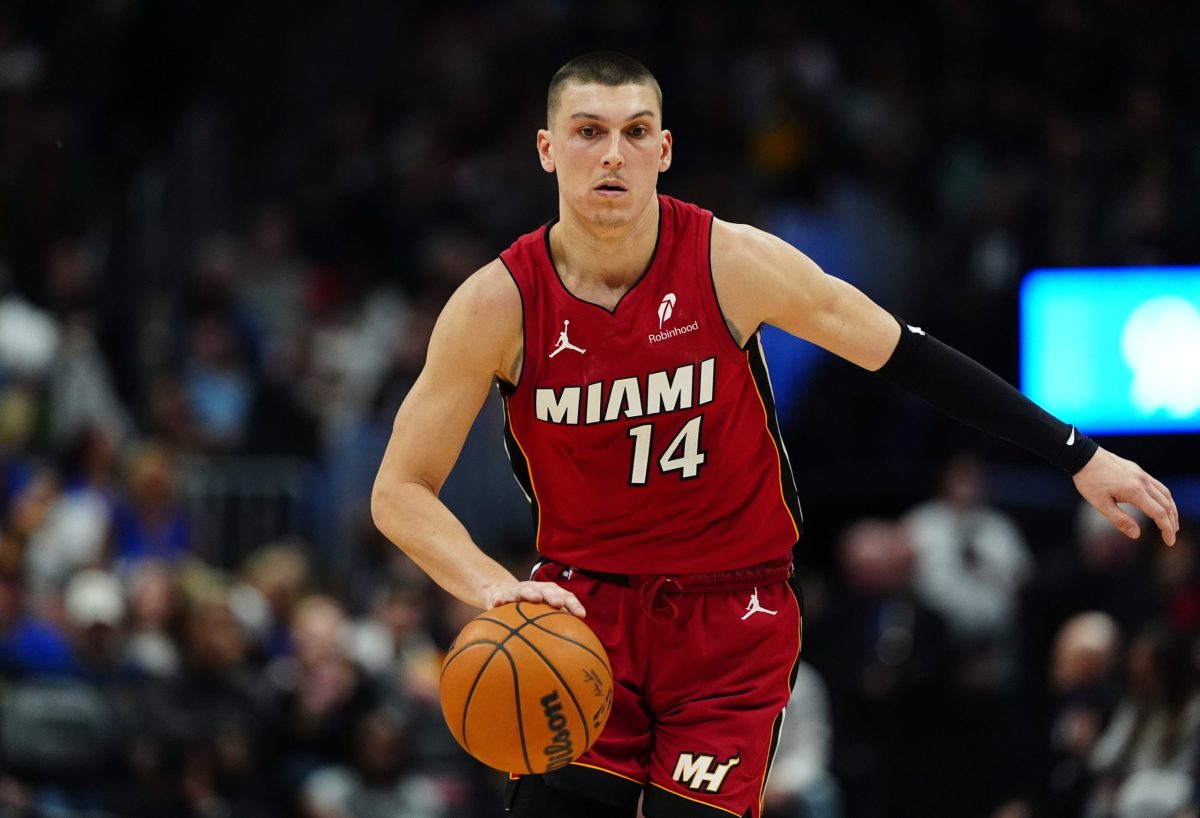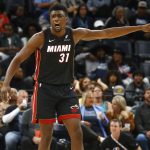In 2002 Udonis Haslem graduated from the University of Florida as the all-time winningest basketball player in Gators history.
A team captain and four-year starter, Haslem never missed a game, tying a Florida record at 130 consecutive games. Thus garnering his well-earned reputation for being both tough and hard working.
Before arriving at UF, Haslem won state titles at Miami Senior High in 1997 and 1998.
Furthermore, Haslem became the first Gator to play on four consecutive NCAA Tournament teams – helping his 2000 team reach the NCAA championship game for the first time in program history. Each of his four collegiate seasons ended with Haslem on an All-SEC Team. During his time in Gainesville, Haslem lost more than 40 pounds and reduced his body fat by more than six percent.
However, he regained all that weight, and then some, his senior season. Haslem ballooned to over 300 pounds. Coupled with Haslem’s 6-foot-8 frame, these were undesirable characteristics in an NBA center.
However, Haslem did possess one immeasurable intangible – his heart.
Unfortunately, Haslem went undrafted – undesired by an NBA franchise.
12 years later, Haslem is still considered undersized – occasionally defending opponents up to half a foot taller than he is – but his passion and determination have always been there, helping “Mr. 305” become a three-time NBA champion.
Without an opportunity to play professionally in the U.S., Haslem was undeterred, electing to play overseas in France and dedicate himself to improving his physique. Changing his eating habits – staying away from most meats and sweets – allowed him to lose 70 pounds (down to 235) in less than a year.
Ultimately, the Miami Heat took a chance on this local product. Haslem was offered a multiyear contract in 2003, the same year Miami drafted shooting guard Dwyane Wade fifth overall in the NBA draft. UD parlayed the opportunity into a spot on the All-Rookie Second Team.
24 starts his first season turned into 80 at power forward his sophomore campaign, coinciding with Miami’s acquisition of former center Shaquille O’Neal via trade. His minutes increased by more than nine a game, as did his scoring (his 54 percent shooting ranked 4th in the league) and rebounding (his 9.1 rebounds were second on the team behind O’Neal).
As Haslem entered free agency in 2005, he had a decision to make. Behind a burgeoning star in Wade and O’Neal still a dominant low-post force, Miami had the pieces to reach the NBA Finals. Playing on a title contender for his hometown team were important factors playing a role in Haslem’s decision of where to resign.
“I am forever thankful to [Miami] and if we can get anything close to a deal done, something around the range of what I should get, even if it’s not as much, I will be glad to take it,” Haslem said back in July 2005.
The end product was nearly $33 million over 5 years, with Haslem leaving more than $10 million dollars on the table, according to his agent, Jason Levien.
That loyalty was typical Haslem, sacrificing, physically and financially, for the betterment of the team.
Although Haslem played with two of the top players in the game (O’Neal and Wade), there was one aspect of his game that made him stand out. Aside from having a constant motor, being a very good defender, possessing a high basketball IQ and his signature braids, Haslem’s toughness was second to none. While Shaq and Alonzo Mourning patrolled the paint blocking shots, Haslem defended in his own way. He was quick when providing help defense and he became known for drawing charges – giving up his body to benefit the team. His offensive fouls drawn were not official statistics, similar to many other parts of Haslem’s game.
During the 2005-2006 season, when Haslem started a team-high 80 games, he played a major role in helping Miami become NBA Champions. In addition to playing air-tight defense on star power forward Dirk Nowitzki in the NBA Finals, Haslem also recorded a double-double (17 points and 10 rebounds) in Miami’s series-clinching Game 6 victory.
[xyz-ihs snippet=”Responsive-Ad”]
In the remaining four years on his contract, Haslem’s numbers looked very similar (around 10.7 ppg and 8.3 rpg) each season. In 2007-2008 he set a personal high of 12.0 points per game and tied a career high 9.0 rebounds a game.
Then, during his contract year Haslem once again made a choice to help the Heat at great personal expense.
Miami drafted power forward Michael Beasley second overall in 2008 and by his second season in the league, Miami’s coaching staff wanted to give the former Kansas State star a larger role. This was ultimately accomplished by starting Beasley in Haslem’s place.
As always, Haslem did not complain. Although he played more than six minutes fewer per game, Haslem’s numbers did not take a noticeable dip.
The summer of 2010 arrived and the biggest anticipation was where Cleveland Cavaliers small forward LeBron James would sign. Everyone else, including Haslem, was an afterthought.
James made “The Decision” to join power forward Chris Bosh and Wade, bringing his talents to South Beach. Meanwhile, Haslem was busy being courted by several suitors, including the Dallas Mavericks and Denver Nuggets. Knowing Haslem’s value to a championship team, Wade convinced Bosh and James to take less money in order to bring back the seven-year veteran. In an act of reciprocity, the Heat organization even threw a surprise 30th birthday party for Haslem, complete with party goers sporting shirts that read “We Want U Back.”
So Haslem re-signed for around $20 million over the course of five seasons, as much as $14 million less than he could have made elsewhere.
“I would be changing my DNA if I left just for money,” Haslem said back in July 2010.
“This is a combination of having a great opportunity to win, which is why we play this game, and an opportunity to still stay close to my family and be with my mother,” said Haslem.
Wade was thrilled to continue his career with the friend he entered the league with and with whom he’d played his entire NBA career.
“UD is here to stay. Sacrifices all [around]. I couldn’t [be] happier for [anyone] more then Mr. Miami himself. My brother [for] life,” Wade tweeted.
Unfortunately, rather than spending the summer of 2010 celebrating, Haslem, spent his time off grieving the loss of his mother to cancer. Haslem wouldn’t be left alone in his loss, with Heat President Pat Riley and other members of Miami’s front office joining the Heat lifer at his mother’s wake. This support meant the world to Haslem and showed his choice to re-sign with Miami was the right one.
Riley, Haslem’s former Heat coach called him “the epitome of what the Heat is about.”
“He is our anchor, he is a true warrior and a great professional,” Riley said about the Heat lifer.
Throughout 12 games of the 2011-2012 season, Haslem was Miami’s best rebounder, leading all NBA reserves in that respect at 8.8 rpg. However, a late November game brought Haslem’s season to a screeching halt. While playing the Memphis Grizzlies, Haslem collapsed on the court and had to be carried off. A ligament tear in his left foot sidelined Haslem until the second round of the playoffs, more than five months.
Miami fell in the Finals that season but the worst part of the basketball season for Haslem was his inability to protect his teammates on the court.
The Heat returned to the NBA Finals the following year, the Haslem of old making an occasional appearance.
In Game 5 of the Eastern Conference Semifinals against the Indiana Pacers UD, once again had Wade’s back. Pacers power forward Tyler Hansbrough committed a Flagrant 1 foul on Wade, and, unsurprisingly, Haslem let Hansbrough know it was unacceptable to touch his friend, earning his own Flagrant 1 call by “handing” Hansbrough a proper UD introduction.
Haslem was suspended for Game 6 and lost more than $34,000 dollars. Wade, in an effort to repay Haslem, responded with 41 points and 10 rebounds. Wade led the team and helped Miami advance to the Eastern Conference Final, ending his night by handing the game ball to Haslem postgame.
“For my brother,” Wade said. “For his sacrifice. I don’t think we win this series without him.”
The 2012-2013 season saw Haslem appearing in 75 games, his most in four seasons, including 59 starts. In November 2012, Haslem claimed the Heat’s career rebounding record, simultaneously becoming the first undrafted player in the NBA to hold a franchise all-time rebounding record.
He added 19 more starts in the 2013 postseason as the Heat won their second consecutive title. In the offseason, Haslem required surgery to repair a torn meniscus, playing 50 games after the injury, his toughness never in doubt.
This offseason, Haslem opted out of the final year of his contract allowing the Heat more financial flexibility to improve the roster. He turned down $4.6 million owed to him in an effort to help the team. Instead, he accepted a two-year contract valued at $5.6 million.
This season may very well be the most productive Haslem has left before he retires. With Miami’s main power rotation likely to consist of Bosh, power forwards Chris Anderson and Josh McRoberts, and possibly center Justin Hamilton, Haslem’s defense and tenacity would be a welcomed invite.
When Haslem’s contract expires in summer 2016, it is likely UD’s jersey will waive in the rafters as he assumes his next role as a Heat staff-member in the same vein as Mourning and Juwan Howard.
Haslem has earned his chance to contribute this season in whatever fashion he is able.
The countless examples of UD’s dependability when it matters most, along with his attitude of never backing away from a challenge have proven Mr. 305 always answers when called upon.
[xyz-ihs snippet=”Responsive-Ad”]
